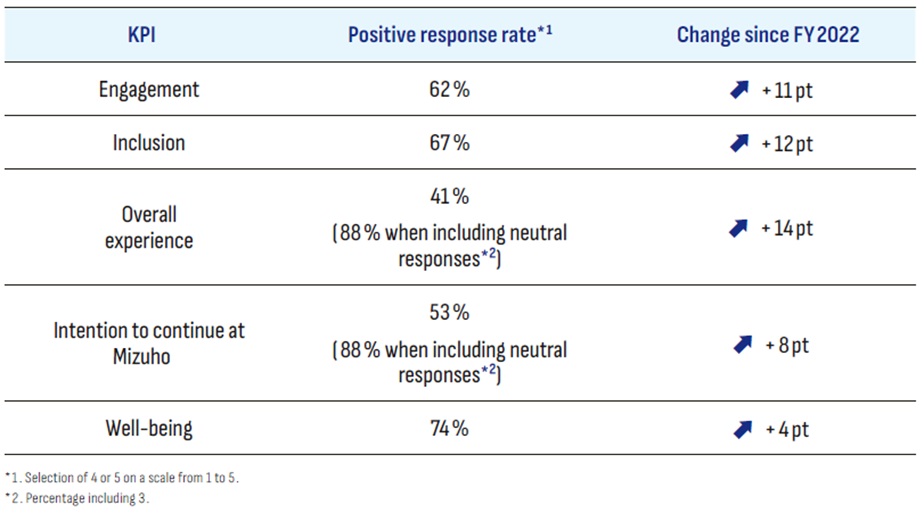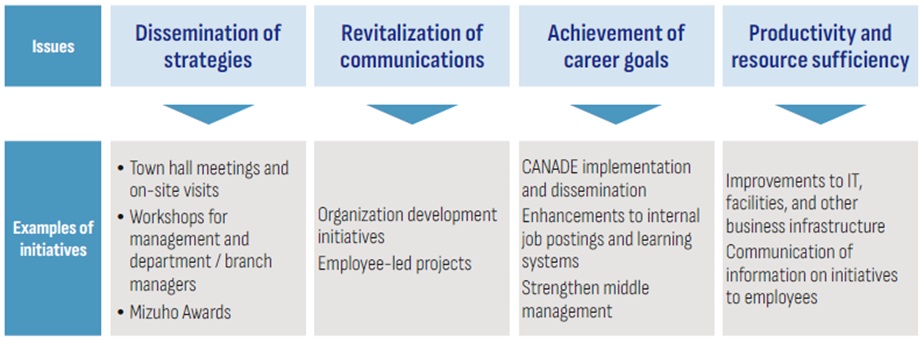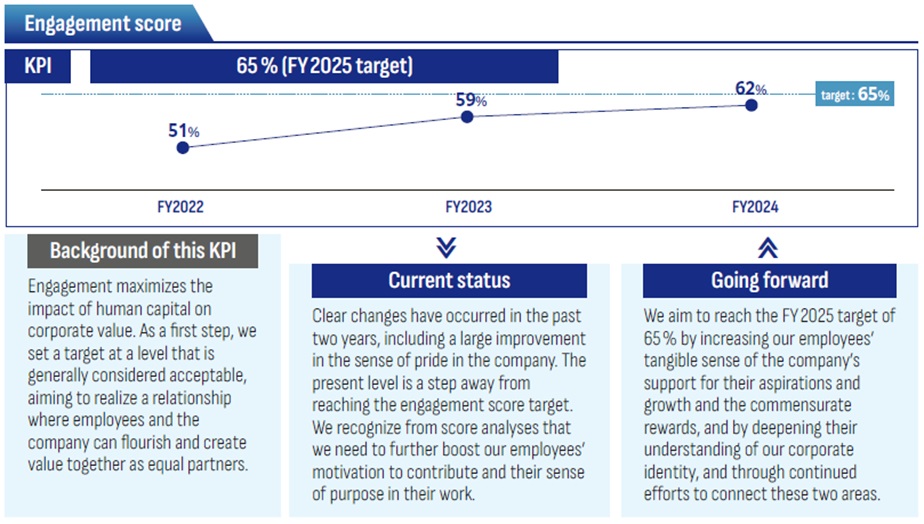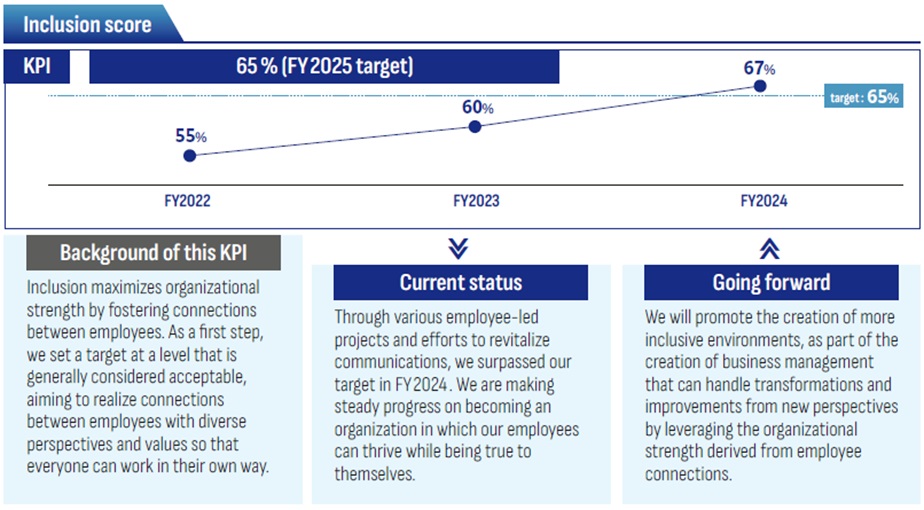Corporate culture transformation
Mizuho publishes the "Human Capital Report" to comprehensively explain how we will create value together with our customers, the economy and society through "Enhancing Human Capital" and "Transforming Corporate Culture". For details on our various human capital initiatives.
Further information
Human Capital Report
Clear changes seen in employee surveys
Identifying issues and taking measures led by management commitment
Corporate culture is a key building block for CANADE in instituting strategic HR while emphasizing employee narratives. Only when there is a positive corporate culture can personnel, who are the creators of corporate value, maximize their abilities and talents. Mizuho aims to transform our corporate culture with the goal of achieving a culture in which all executives and employees identify personally with the corporate identity, think and act on their own to embody the identity, and act in unity to provide value to our customers, the economy, and society.
Improving employee engagement through corporate culture transformation is the foundation that supports Mizuho's growth strategies. When each employee with an inherent motivation to contribute is able to manifest their strengths and individuality and to work in a way that feels genuine to them while connecting with others, this then becomes the driver of business growth. A virtuous cycle emerges, as business growth further elevates employee motivation.
To sustain this virtuous cycle, we have to regularly and accurately ascertain the situations our employees are in. For this reason, we conduct periodic employee surveys and take actions based on the findings of the surveys. Over the past several years, Mizuho has identified corporate culture transformation as a key issue and has been actively addressing it. As a result of these efforts, we have observed tangible changes in employee attitudes, which we believe is the outcome of regular communication of messages from management and engaging in dialog with our employees on the frontlines of our business.
Clear changes seen in employee surveys
Since FY2023, we have been taking consistent measures to encourage each employee to identify personally with our corporate identity and to revitalize internal communications, and we began to see signs of changes because of these measures. However, in FY2024, we got a true sense of solid and lasting transformations in the corporate culture and in the attitudes and actions of our employees. Evidence for this is the inclusion score, a KPI, on the employee survey. The score has surpassed the medium-term management plan target, and the engagement score is a step away from reaching its target as well. Scores for other KPIs have also shown steady improvements.
Percentage of positive responses to KPI questions

Identifying issues and taking measures led by management commitment
Scores for many questions on the employee survey improved, indicating the positive impact of efforts to date. Nevertheless, there are areas where no improvement was seen or where scores remain low. An analysis of the scores identified and classified the following four issues, which are now being taken up by the group.
Understanding and implementing strategies
We have been consistently communicating messages from management and working to deepen employees' understanding of our corporate identity, as a means of further sharing our corporate identity and management's approach to strategies. We have seen changes in how our employees accept these messages after repeated dialog sessions between management and employees at town hall meetings and on-site visits.
We held workshops and other events for department / branch managers to further instill our corporate identity within the organization. As a result of these initiatives, we have seen a heightened awareness and growing movement toward changing the organization for the better, such as department / branch managers identifying personally with Mizuho's Purpose and Values and taking the lead in engaging in dialog with members of their organizations.
We have verified some positive outcomes after our initial focus on fostering alignment with Mizuho's Purpose. Therefore, we have shifted our focus to fostering alignment with Mizuho's Values while continuing with multi-layered initiatives.
Improving communication
We have implemented various measures aimed at fostering a corporate culture in which our employees can take the initiative in challenging; building a sense of unity through mutual recognition of personalities from diverse backgrounds; and revitalizing internal communications.
Organization development initiatives taken since FY2022 to stimulate employee-employee relationships and to boost organizational vitality tie in with a greater sense of fulfillment at work and the fostering of a sense of unity within organizations. We also support independent employee actions to enhance interaction among our employees and to revitalize internal communications, through such means as employee-led projects and the use of internal social media platforms.
Nevertheless, there is still room for improvement in employees' acceptance and perceptions of unity. Therefore, we will continue to pursue our initiatives while monitoring their results through employee surveys.
Achievement of career goals
We held information sessions in FY2024 to hear opinions from our employees and answer their concerns regarding career independence, as a means to further disseminate the CANADE HR framework, which encourages employee development and growth and rewards their contributions. The information sessions aimed to promote further understanding and awareness through bi-directional communications (See the section on Careful dissemination of the new HR system through conscientious dialog, P. 20.) We have also focused on enhancing the systems that support our employees in taking on new challenges and on strengthening middle management. (See the sections on Career Development Management encourages employees to achieve career independence, P. 13, and Upskilling for middle managers, who foster career independence, P. 18.) While we have seen steady improvements in scores as a result of these efforts, we have yet to reach satisfactory levels. We recognize the need for career support tailored to our employees' career aspirations and individual circumstances.
Productivity and resource sufficiency
Improvements to facilities, IT infrastructure, and other resources are essential elements supporting the work of our employees. Accordingly, we have been moving ahead sequentially with initiatives such as upgrading office equipment, replacing computers, and introducing IT tools. We strive to provide our employees with information about the state of these improvements, but the effects of these initiatives and the tangible benefits for our employees have yet to be realized. We will push forward with necessary initiatives while ascertaining the situations at each organization.
Issues identified from the employee survey and examples of initiatives taken

Further information
Human Capital Report List of data (Corporate culture transformation) (PDF/6,886KB)

